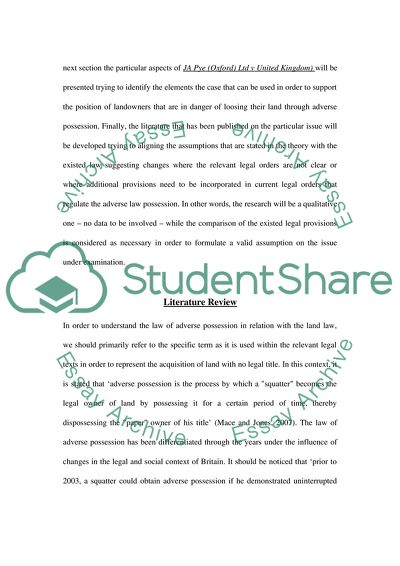Cite this document
(Land Registration Act 2002 to Rescue the Landowners from Theft Research Proposal Example | Topics and Well Written Essays - 1250 words, n.d.)
Land Registration Act 2002 to Rescue the Landowners from Theft Research Proposal Example | Topics and Well Written Essays - 1250 words. https://studentshare.org/law/1544613-neither-the-european-courts-nor-the-land-registration-act-2002-have-come-to-the-rescue-of-landowners-who-sleep-whilst-others-use-their-land-land-theft-by-adverse-possession-is-still-a-reality
Land Registration Act 2002 to Rescue the Landowners from Theft Research Proposal Example | Topics and Well Written Essays - 1250 words. https://studentshare.org/law/1544613-neither-the-european-courts-nor-the-land-registration-act-2002-have-come-to-the-rescue-of-landowners-who-sleep-whilst-others-use-their-land-land-theft-by-adverse-possession-is-still-a-reality
(Land Registration Act 2002 to Rescue the Landowners from Theft Research Proposal Example | Topics and Well Written Essays - 1250 Words)
Land Registration Act 2002 to Rescue the Landowners from Theft Research Proposal Example | Topics and Well Written Essays - 1250 Words. https://studentshare.org/law/1544613-neither-the-european-courts-nor-the-land-registration-act-2002-have-come-to-the-rescue-of-landowners-who-sleep-whilst-others-use-their-land-land-theft-by-adverse-possession-is-still-a-reality.
Land Registration Act 2002 to Rescue the Landowners from Theft Research Proposal Example | Topics and Well Written Essays - 1250 Words. https://studentshare.org/law/1544613-neither-the-european-courts-nor-the-land-registration-act-2002-have-come-to-the-rescue-of-landowners-who-sleep-whilst-others-use-their-land-land-theft-by-adverse-possession-is-still-a-reality.
“Land Registration Act 2002 to Rescue the Landowners from Theft Research Proposal Example | Topics and Well Written Essays - 1250 Words”. https://studentshare.org/law/1544613-neither-the-european-courts-nor-the-land-registration-act-2002-have-come-to-the-rescue-of-landowners-who-sleep-whilst-others-use-their-land-land-theft-by-adverse-possession-is-still-a-reality.


